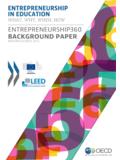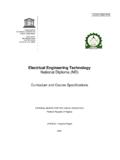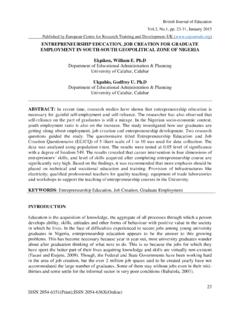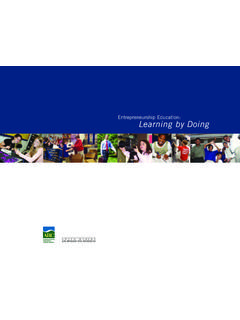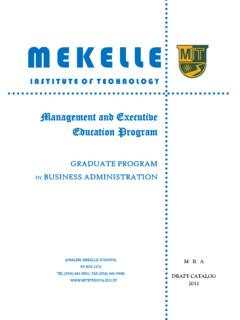Transcription of Disclaimer - OECD
1 Disclaimer This work is published under the responsibility of the Secretary-General of the OECD. The opinions expressed and the arguments employed herein do not necessarily reflect the official views of OECD member countries. This document and any map included herein are without prejudice to the status of or sovereignty over any territory, to the delimitation of international frontiers and boundaries and to the name of any territory, city or area. Acknowledgements This thematic paper was prepared for the Entrepreneurship360 initiative of the Organisation for Economic Co-operation and Development (LEED Programme) and the European Commission (DG education and Culture).
2 A draft version of the paper was prepared by Norris Krueger from the School of Advanced Studies, University of Phoenix and Entrepreneurship Northwest. Comments were received from the Entrepreneurship360 expert group (Catherine Brentnall, Ivan Diego, Malcolm Hoare, Norris Krueger, Martin Lack us, Sabine Mueller, Andrew Penaluna, Kathryn Penaluna, Elena Ruskovaara, Helena Sagar, Olivier Toutain, and Fred Verboon), Elin McCallum (formerly DG education and Culture), Andrea-Rosalinde Hofer and Joseph Tixier from OECD LEED. The final paper was edited by Andrea-Rosalinde Hofer. The author is deeply grateful for their remarkable insights and encouragement.
3 Entrepreneurship360 is part of the OECD LEED's work programme on Skills for Entrepreneurship; Cover visual: Joseph Tixier TABLE OF CONTENTS _Toc430684618 A COPERNICAN REVOLUTION IN ENTREPRENEURIAL education .. 6 Outputs: .. 7 Issue 1: How is entrepreneurial mindset defined? Can we provide a rigorous definition? 7 Issue 2: How is mindset measured? Do we need to develop a protocol for assessment? .. 7 Issue 2a: Is entrepreneurial mindset measured at all?.. 7 Issue 2b: Are we assessing other important outcomes? .. 7 Throughputs: .. 8 Issues 3a and 3b: How experiential is the curriculum? Truly experiential vs. "hands on".
4 8 Issues 4: Does the organisational setting impede or support experiential learning? .. 9 Inputs: .. 9 Issue 5: How skilled/experienced are the instructors? .. 10 Issue 5a: Do they need to share the entrepreneurial mindset (or deeply understand it)? .. 10 Issue 6: Are learners already "entrepreneurial"? .. 10 THE BACKGROUND: WHAT DO WE (THINK WE) ALREADY KNOW?) .. 10 From Novice to Expert .. 11 Defining and Measuring the Mindset .. 12 Candidate Dimensions of the Entrepreneurial Mindset .. 13 The Lessons of Entrepreneurial Experience? .. 13 Future Markers to Test and Future Prospects for Measures .. 15 REFERENCES .. 18 Tables Table 1. A simplified view of how modern pedagogy has evolved.
5 8 Figures Figure 1. The role of critical development experiences .. 12 A COPERNICAN REVOLUTION IN ENTREPRENEURIAL education 1. As educators and policy-makers, we all want to believe that what we do will make a difference. Bold, if plausible, claims are increasingly made that entrepreneurship education has an impact, not just on an informed intent to be an entrepreneurs but also as a life skill. We would like to think that is true. It is further claimed that the key to those deep impacts is experiential learning. We would really like to think this is true. The heart of these claims is that the leading edge entrepreneurial programmes focus less on students gaining content knowledge about entrepreneurship but instead focus more on developing the entrepreneurial mindset.
6 2. However, reviews of the literature purporting to assess the impact of entrepreneurship education show little evidence about the impact of deeply experiential programmes, almost never look at deep cognitive change (mindset) and are based on limited theoretical 3. Isn t what educators are trying to do is help learners move from a more novice mindset toward a more expert mindset? This requires looking at deep cognitive change (it also requires us to validate our constructs and measures.) To achieve this we need to start by defining carefully and rigorously the dimensions of the entrepreneurial mindset.
7 Ultimately, we then identify, test and validate measures that capture those dimensions rigorously. 4. Three key premises drive this analysis. Firstly, we assume the "entrepreneurial mindset" reflects deep cognitive phenomena, particularly deep beliefs and assumptions. Secondly, these only change through transformative learning experiences2. Thirdly, we believe that a useful way to view mindset-change is helping learners move from a more novice mindset toward a more expert mindset. 5. To assess the impacts of educational interventions it is often useful to think in terms of outputs, throughputs and inputs.
8 Impact is often a combination of effects from the students, the teachers, course content, and course process3. For example, students who are eager (and able) to learn can profit greatly even if the other factors are negative. What if entrepreneurship training is perceived as highly effective simply because of highly motivated learners? On the other hand, it is even more likely that we need all the components. For example, a hostile or turbulent environment or inhibiting processes could either suppress learning or spur it, if the content, teachers and students are strong. Great content alone is unlikely to be sufficient but may be necessary.
9 Finally, as we will see below in the role of teachers in helping novices move toward expert, having the right instructors is likely to be necessary. Again, it still comes down to this reality: Practical value for civic officials and teachers demands conceptual clarity and rigorous analysis. Champions of experiential entrepreneurship training such as the Ewing Marion Kauffman Foundation have led the call for more rigor and clarity. 1 Nor do we see much use of sophisticated research designs and methodology (Nabi, et al. 2014), let alone taking advantage of developmental psychology and cognitive neuroscience ( , Krueger 2007, Krueger & Welpe, 2014).
10 2 Oversimplifying slightly, transformative learning follows the constructivistic model of learning that focuses on changing how we structure the knowledge we have and acquire (versus the behavioristic model that focuses on acquiring factual knowledge. Note, however, that deep cognitive changes are quite difficult to measure directly. 3 Most research on the impact of entrepreneurship education /training is remarkably atheoretic and fails to consider all of these potential predictors/moderators. Outputs: 6. Entrepreneurship programmes love to say they no longer teach students about entrepreneurship, we are now teaching them to do entrepreneurship: An admirable but not well-defined goal.)










